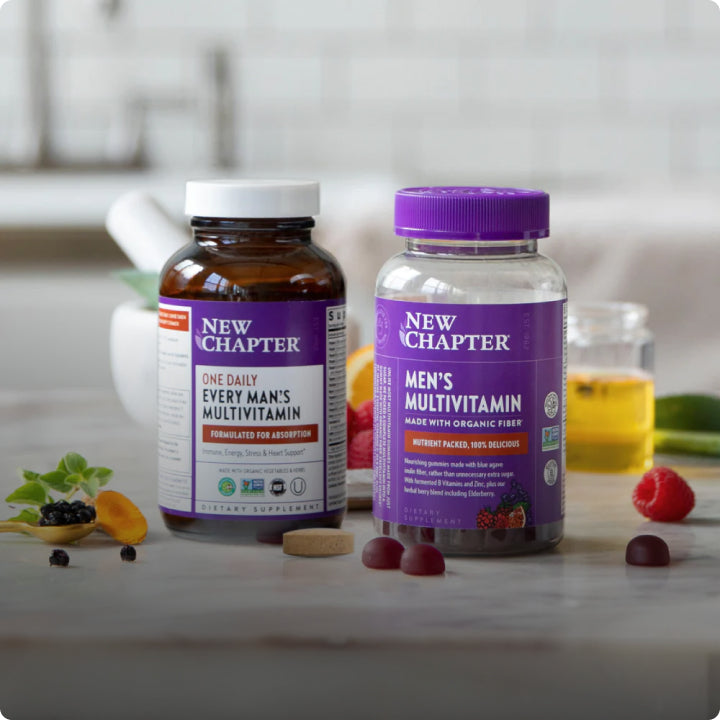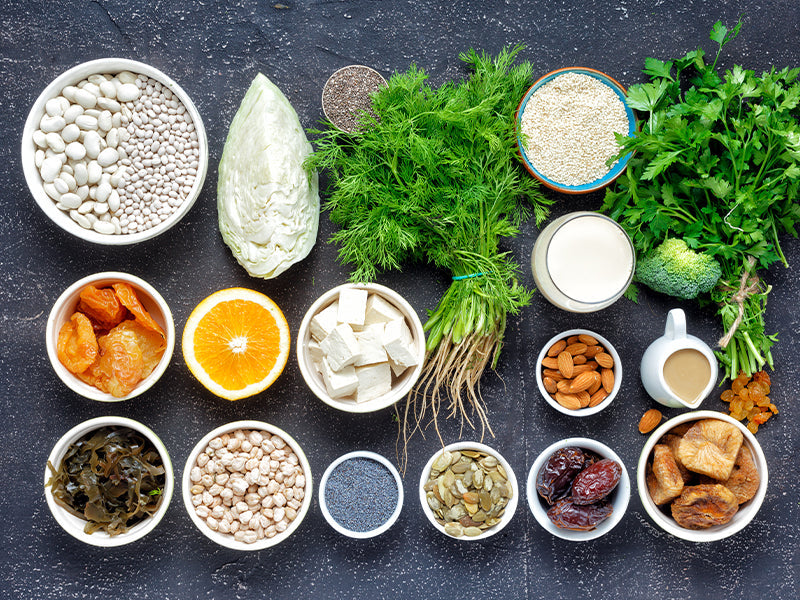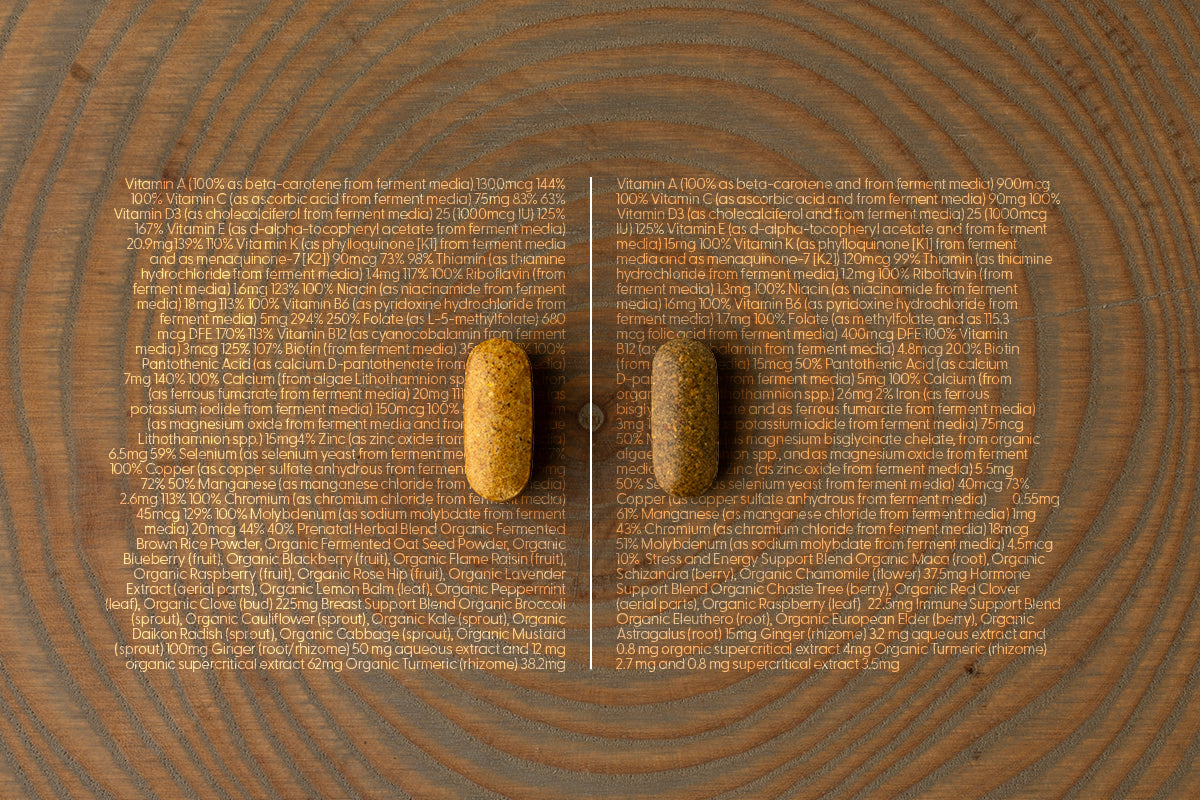Plant-based eating patterns are taking root! Americans are switching up their diets in favor of eating more plants, whether it’s having meatless Mondays, saying no to dairy or red meat, or becoming fully vegetarian or vegan. Plant-based eating is a good move for supporting global sustainability, as it helps reduce carbon emissions, improves global food security, and uses resources more efficiently. We love a plant-based lifestyle.
But as you’re eating more plants every day, you may wonder if it’s causing any nutritional gaps. If you’re not drinking milk, for example, how do you know if you’re getting enough dietary calcium? The good news is, there are plenty of ways to keep your body well-supplied with daily calcium from the world of plants. Let’s bone up on calcium right now!
What is Calcium?
Calcium is an essential mineral that is abundant on our planet and in our bodies. About 99% of body calcium is stored in our bones. Because calcium is so important for life, the body takes it from the bones whenever it’s needed for maintaining a consistent level in the bloodstream. If you think about it, your bones are doing double-duty in both providing structure for your body AND storing Calcium for your needs minute by minute.
What Does Calcium Do?
Your body uses calcium for multiple functions. We often think of calcium as the mineral that supports strong and healthy bones and teeth, and this is very true. But calcium is also critical for heartbeat, blood clotting, nerve function, blood vessel function, and hormone release. And if you’re not getting enough dietary calcium? The body will remove calcium from the bones to use. These withdrawals from the “bone bank” can cause bones to become porous, brittle, and weak—a condition called osteoporosis. In addition, bone density starts to naturally decline around age 30.

How Much Calcium Do You Need?
The recommended dietary intake of calcium for adults age 19 and over is 1,000 mg per day, and this goes up to 1,200 mg per day for women over 50 and men over 70. Everybody needs calcium, but according to the National Institutes of Health, females are more prone to not getting enough calcium from food each day—particularly adolescent females.
| Recommended Dietary Intake of Calcium per Day | |
| Women 19-50 (including pregnant & breastfeeding women) | 1000 mg |
| Men 19-70 | 1000 mg |
| Women 50+ | 1200 mg |
| Men 70+ | 1200 mg |
| Source: National Institutes of Health | |
How to Boost Your Calcium in a Plant-Based Diet
Both women and men can support the body’s critical need for calcium by eating calcium-rich foods and by supplementing with a well-absorbed source of this bone mineral.

8 Non-Dairy Sources of Calcium
Did you know that more than half of adults are not able to digest milk or dairy products well, due to lactose intolerance? Others, including vegans, may not want to consume cow milk or fish with bones. So, add non-dairy foods brimming with calcium to your day!
Non-Dairy Source of Calcium |
Amount of Calcium |
Tofu, prepared with calcium (1/2 cup) |
434 mg |
Orange juice, calcium fortified (1 cup) |
349 mg |
Collard Greens, cooked (1 cup) |
122 mg |
Kale, cooked (1 cup) |
95 mg |
Dried Beans, cooked or canned (1 cup) |
180 mg |
Sardines, canned, with bones (3 ounces) |
325 mg |
Salmon, canned, with bones (3 ounces) |
180 mg |
Almonds (1/4 cup) |
100 mg |
| Sources for nutrition data: Cleveland Clinic, Dietary Guidelines 2015-2020 | |
Plant-Based Calcium Supplements
If you’re adding a calcium supplement to your routine, we’re fans of finding high-quality, sustainably sourced ingredients that your body can recognize and use just like food. That’s why we recommend getting calcium from plants, not rocks.
Here’s the breakdown: Most calcium supplements deliver calcium carbonate, a form of calcium with a comparatively high concentration of the element. However, many calcium carbonate supplements are derived from limestone—a rock form that lacks other bone-supportive nutrients. Fortunately, calcium carbonate can also be sourced from plants— Red Marine Algae (Lithothamnion) to be exact. Plant calcium is porous and complex, and lives as part of a whole matrix of minerals organized in a natural honeycomb structure. Plant calcium can be sustainably harvested and certified organic. Plant-based calcium is a whole food the body can easily recognize, and Lithothamnion also delivers Magnesium and 70+ trace minerals.

How to Absorb Plant-Based Calcium
No good loading up on delicious plant calcium if your body can’t use it! If you eat a lot of plant-based foods in a day, there are some “anti-nutrients” that you may choose to space out in your diet. Plus, Calcium needs key helper vitamins to be used in the right way in your body.
Oxalates & Phytates
Oxalates and phytates are “anti-nutrients” that temporarily reduce the body’s absorption capability. They’re naturally occurring compounds in some plants. In the case of calcium, oxalates in certain greens (like spinach) can block calcium absorption. Phytates (a form of stored phosphorus) are present in some whole grains, seeds, and nuts, and these can interfere with calcium absorption too.
It’s believed that soaking food or simply cooking it will help deactivate the anti-nutrients. If you eat a varied diet, it’s not likely that your calcium absorption will be significantly hindered. However, if you’re concerned about anti-nutrients or risk of calcium deficiency, try to spread out your intake of oxalates and phytates. For instance, you could avoid having 1 cup of spinach and 1 cup of legumes at the same meal.
Calcium & Vitamin D
For proper calcium absorption by the bones, you need some D3 as a helper vitamin. The body makes vitamin D naturally when skin is exposed to sun, but that’s not always possible or reliable. In a plant-based diet, you can look to mushrooms, fortified orange juice, and fortified plant milks for Vitamin D. Or take a plant calcium supplement that is formulated for absorption and already includes Vitamin D3 to support bone density and normal bone creation.*

How Much Calcium is “Too Much” ?
Too much of a good thing? While you’re taking care to get enough Calcium in your day-to-day life, keep in mind that you don’t need excessive amounts. Research shows that the body doesn’t absorb large amounts of calcium at a time. However, calcium is very important, so don’t skimp either! It’s best to stick with the recommended amount of 1000-1200 mg per day. A well-made bone-health supplement should be formulated to put you in this range while accounting for Calcium you get from food.
Strong Bones, Long Life
If you’re eating more plants, that is awesome. Compassion for animals and concerns about climate change and global food shortages have been changing many minds and diets. To make sure you’re getting the calcium your body needs, add high-quality, sustainably sourced, bone-strengthening plant calcium to your wellness regimen with Bone Strength Take Care™. Maintaining strong healthy bones is so important for overall quality of life, especially for healthy aging. Our formula has added Vitamins K2 & D3 to guide the plant calcium to your bones for absorption.* Helps reduce the risk of osteoporosis†!
†Adequate calcium throughout life, as part of a well-balanced diet, may reduce the risk of osteoporosis.






